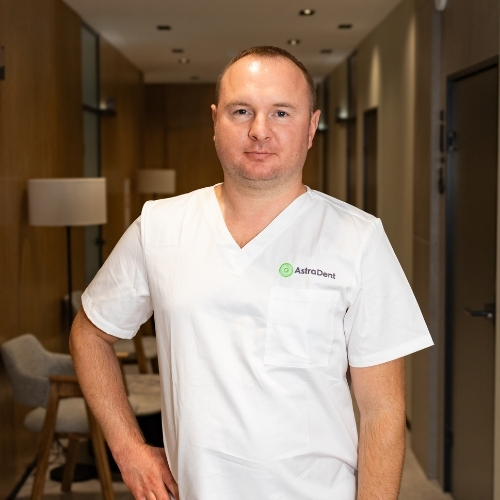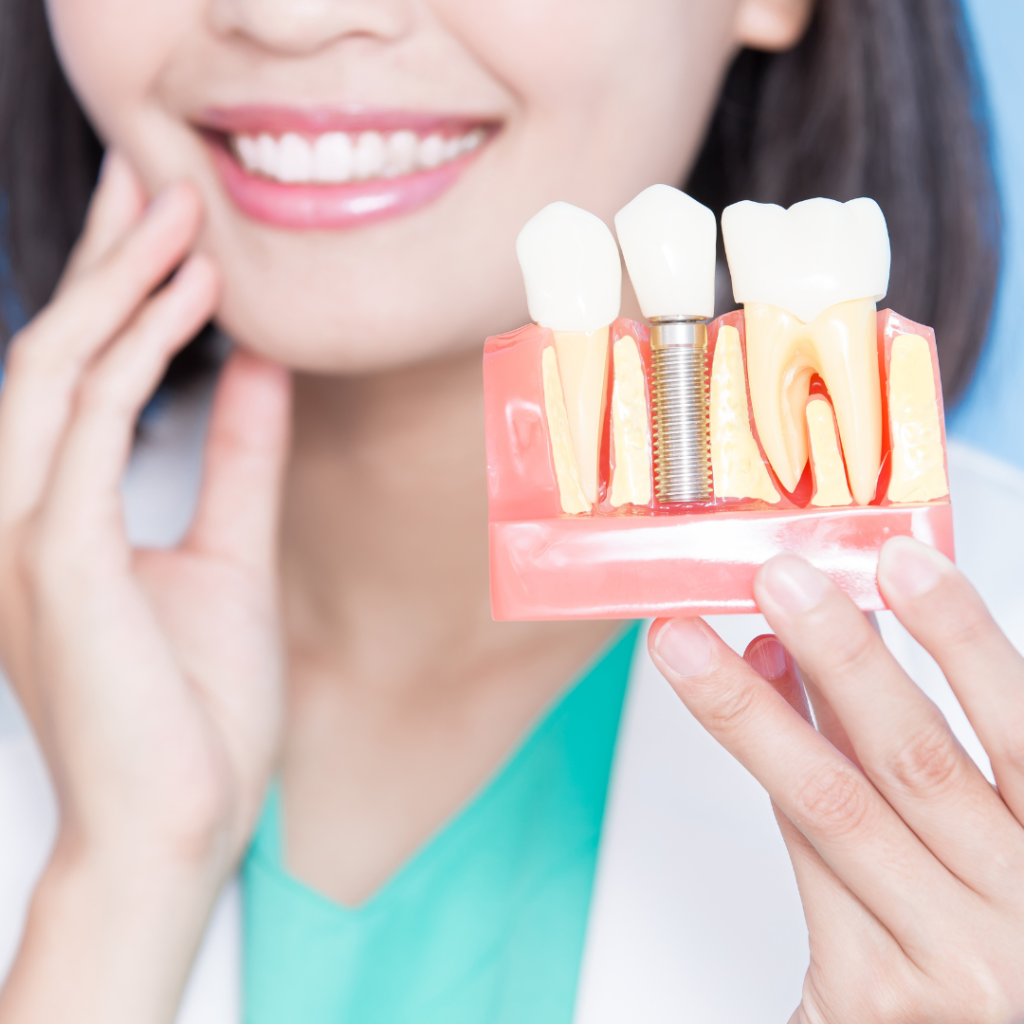A cracked tooth crown is a serious dental problem that is potentially dangerous for nerve endings, infection, pain when chewing, inflammation of the gums and damage to the tooth root. Orthopedic structures can withstand pressure of up to 70 kg per square centimeter. But even the strongest supragingival prosthesis is not eternal. The average service life is 5-15 years.
A fallen out or cracked crown requires immediate intervention. Under the structure, a prepared tooth, a root remnant or a treated canal with a removed nerve often remains. If the seal is broken, there is a risk of infection of the pulp (the inner tissue of the tooth, which contains nerves and blood vessels) or the periapical zone (the area around the root apex). This can cause acute inflammation, swelling, pain, and later — an abscess or destruction of the remaining tooth tissues.
Any delay in such a situation complicates further treatment. Attempts to fix the crown yourself using adhesives or painkillers are potentially dangerous. A full clinical assessment is necessary: visual examination, X-ray examination, determination of the residual structure of the tooth. After that, the doctor makes a decision — is it possible to re-fix, temporary stabilize, restore or manufacture a new orthopedic structure.
Why do patients turn to Astra Dent Warsaw with a cracked crown?
Up to 7.7% of all appeals for orthopedic restorations are associated with mechanical damage — cracks or complete destruction of crowns. Most often this concerns metal-ceramic structures, where the ceramic coating peels off over time, or zirconium prostheses, which undergo microcracks under excessive load or incorrect bite. In 7 out of 10 cases, the problem does not occur suddenly, but as a result of overload or imperfect fixation.
Astra Dent offers accurate diagnostics, high-quality materials and a professional approach without unnecessary appointments. The medical center specializes in complex clinical cases – including cracks, chips and decementation of crowns. All procedures are performed in accordance with international dental treatment and restoration protocols.
Advantages of crown restoration at Astra Dent Warsaw:
- Experienced dentists who will quickly assess the problem and choose the best solution. The dental office is staffed by doctors with over 10 years of experience in the field of prosthetic dentistry. Specialists are trained in Poland, Germany, Ukraine and other European countries. They work on the principle of "minimum intervention": before replacing the crown, the condition of the supporting tooth and the connection is diagnosed. In complex cases, related specialists are involved – periodontists or endodontists.
- Use of modern materials that last a long time. Astra Dent uses certified class A materials: zirconium, press ceramics (E.max), hybrid nanocomposites. For example, zirconium dioxide crowns have a strength of over 1000 MPa (compared to 350-450 MPa for metal ceramics), which, with proper care, last up to 15-20 years. For fixation, a double-polymerized cement resistant to hydrolysis and micropenetration is used.
- English-speaking staff, convenient location in Warsaw. Our specialists speak English, which eliminates misunderstandings when communicating with the doctor. The patient receives a clear explanation of the diagnosis, treatment options and support at all stages. Astra Dent is located near the main transport hubs of Warsaw, 1 minute from the "Świętokrzyska" metro station.
- Quality guarantee for new crowns. All orthopedic structures are provided with a written guarantee – from 12 to 36 months, depending on the type of material. In case of defects associated with manufacturing or laboratory errors, the replacement is carried out free of charge. The warranty terms are discussed during the consultation, and the patient receives an official warranty card with the terms and conditions of service.
Patients turn to Astra Dent for a reliable and safe solution to the problem. Crown restoration is considered by specialists not as a routine procedure, but as a complex task, taking into account the anatomy of the tooth, the condition of the tissues, the load and the cause of the breakdown. Each decision is based on diagnostic data and medical indications.
The main causes of cracks and breakage of crowns
Crown damage is never an accident. It occurs gradually, due to a combination of external and internal factors. Most often, patients encounter cracks, chips of facing ceramics and delamination of parts of the prosthesis.
Causes of damage to orthopedic structures:
- Mechanical load. Frequent biting off of hard foods — nuts, crackers, ice — creates peak loads on the crown part of the tooth. With prolonged exposure to such factors, microcracks appear in the prosthesis, which over time turn into a visible chip or crack. An additional risk is bruxism (grinding teeth during sleep), which causes constant vibration loads that can deform even the zirconium base.
- Material wear. Crowns have a limited service life. Surface wear, cement aging, micropenetration in the fitting area — all this worsens stability. Most often, cracks appear in crowns that are more than 8-10 years old. In most cases, this applies to metal ceramics, where the facing layer peels off over time. If low-quality or uncertified materials are used, damage can appear after a few years.
- Installation errors. Incorrect fit of a fixed microprosthesis or excessive contact with antagonists in the bite creates a point load. As a result, the uniform distribution of chewing force is disrupted, which leads to local deformations. It is extremely dangerous if the edge of the crown extends beyond the gum or hangs over — this violates hygiene, causes inflammation and contributes to weakening of fixation.
- Caries or inflammation under the crown. Even if the tooth is covered with a crown, it is not protected from secondary caries. Microcracks at the junction with cement or impaired tightness increase the risk of bacterial infection. If inflammation develops under the structure, the tooth loses stability, and the load on the crown is distributed unevenly. In such cases, damage is usually a symptom of a deeper problem — and requires comprehensive intervention.
Understanding the causes of damage helps to choose the right treatment tactics and prevent repeated breakages in the future. Astra Dent specialists analyze each case — with an assessment of the bite, material, and condition of the supporting tooth.
What to do if the crown is cracked?
A damaged crown is open access to the internal tissues of the tooth, which are vulnerable to infections, temperature stimuli and mechanical pressure. Even a small crack or chip leads to complications — inflammation of the periapical tissues, purulent formations, tooth loss.
Therefore, you need to act quickly and correctly:
- Do not try to glue or restore the crown yourself. Pharmacy adhesives, household products, temporary filling materials do not provide tightness, sterility and mechanical stability. Their use complicates further dental intervention. Incorrect fixation can change the bite, injure the gums or damage the remaining structure of the tooth.
- Contact a dentist as soon as possible. Firstly, make an appointment at Astra Dent. The sooner the damaged area is examined, the greater the chance of avoiding deep intervention. The doctor will conduct an examination, take a targeted photograph, determine the presence of a crack in the abutment tooth or secondary caries under the crown. In some cases, temporary fixation or restoration is possible without complete replacement of the structure.
- Avoid chewing on the damaged crown. Any load can deepen the crack or break the remaining part of the prosthesis. Before consulting a doctor, it is worth completely eliminating chewing on this side, avoiding hard, hot or cold foods that irritate exposed areas.
- If there is severe pain, take painkillers and make an appointment. If acute pain, swelling, or sensitivity to temperatures occurs, it is allowed to take a non-steroidal anti-inflammatory drug (for example, ibuprofen at a dosage of 200-400 mg). But this is a temporary measure. Pain relief does not solve the problem, but only masks it, so a visit to the dentist should not be postponed even for a day.
A quick response and correct actions in the first stages are a chance to save the tooth and avoid complex intervention. Astra Dent accepts patients with damaged crowns as a priority in order to reduce risks and start treatment immediately.
Crown restoration methods at Astra Dent Warsaw
The choice of restoration method depends on the nature of the damage, crown material, condition of the abutment tooth, and associated complications. Astra Dent specialists in Warsaw conduct a comprehensive diagnosis: examination, digital scanning, and X-ray examination. This allows us to accurately determine whether the structure can be repaired or whether a complete replacement with treatment of the abutment tooth is required.
Crown repair
If the damage is superficial — a small crack, a chip in the ceramic layer without exposing the inner part — a local repair is performed. The dentist cleans and restores the damaged area using photopolymer materials or a special composite for ceramics. In some cases, silane treatment is used (for chips on zirconia) to ensure a reliable connection of materials. Repair extends the service life of the crown by 1-3 years.
Complete crown replacement
When the crack passes through the thickness of the structure or its delamination is observed, restoration is impractical. In such cases, a new orthopedic structure is manufactured. Astra Dent uses:
- zirconium dioxide;
- E.max-pressed ceramics;
- hybrid CAD/CAM materials (for posterior teeth).
To increase the accuracy of taking impressions, an intraoral 3D scanner is used. Modern crowns withstand loads of more than 900 MPa, have high aesthetics and retain color even after years.
Crown replacement with tooth treatment
In some cases, caries, secondary inflammation or destruction of residual tissues are detected during the removal of the old crown. In such a situation, staged treatment is performed:
- removal of the old structure;
- cleaning of the affected tissues;
- endodontic therapy (if necessary);
- restoration of the stump of the tooth (for example, using a fiberglass post);
- fabrication and installation of a new crown.
In the presence of deep destruction, bone grafting or implant placement is necessary with subsequent orthopedic rehabilitation. Astra Dent uses international restoration protocols, and all stages — from diagnostics to fixation — are performed under the control of a microscope or digital camera, which ensures accurate fit, durability of the structure and safe integration with tooth tissues.
How to make an appointment?
If you have lost a filling or feel discomfort, do not postpone a visit to the dentist. Astra Dent doctors in Warsaw will quickly restore the tooth using hypoallergenic materials and modern treatment methods. The procedure is painless and comfortable for the patient.
You can make an appointment in a convenient way:
- by calling +48 533 599 552;
- by sending a request to email: info@astradent.pl;
- via the online form on the website astradent.pl.
A preliminary appointment guarantees quick service without queues and stress. The doctor conducts an examination without haste, analyzing the condition of the tooth to choose the best method of restoration. The sooner you contact us, the easier and less expensive the treatment will be.

Last update:
17 July 2025, 20:56






















